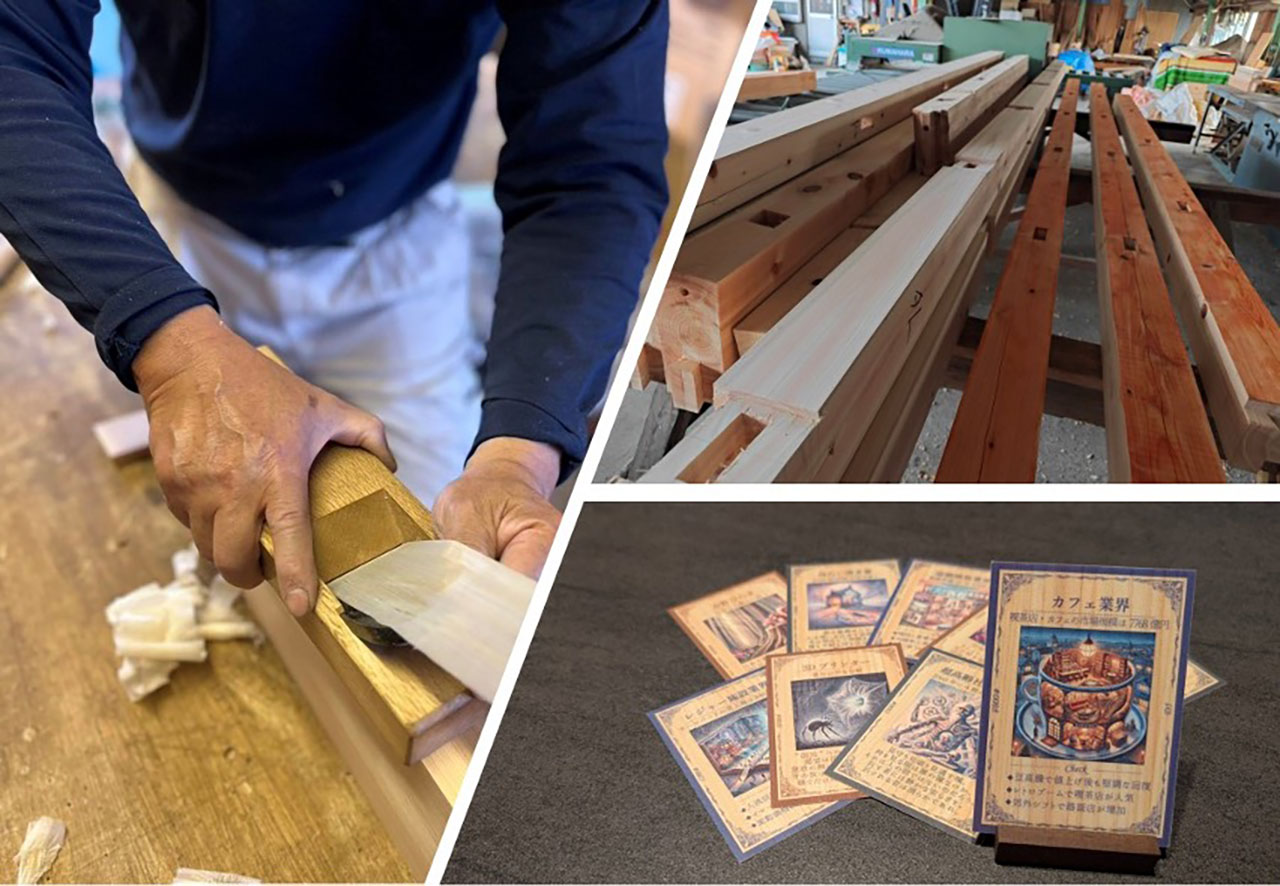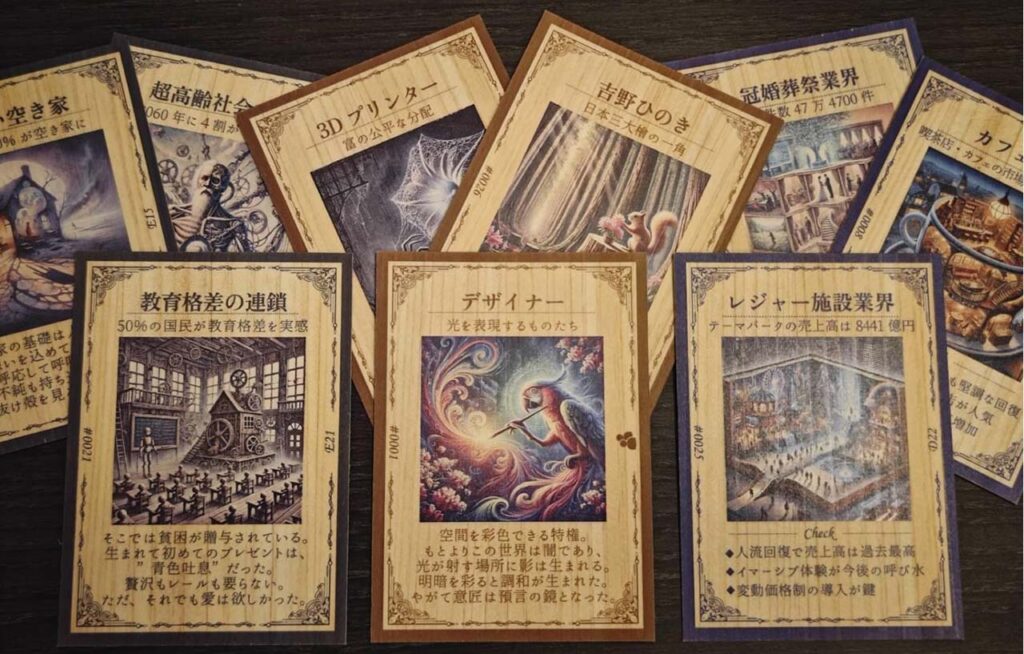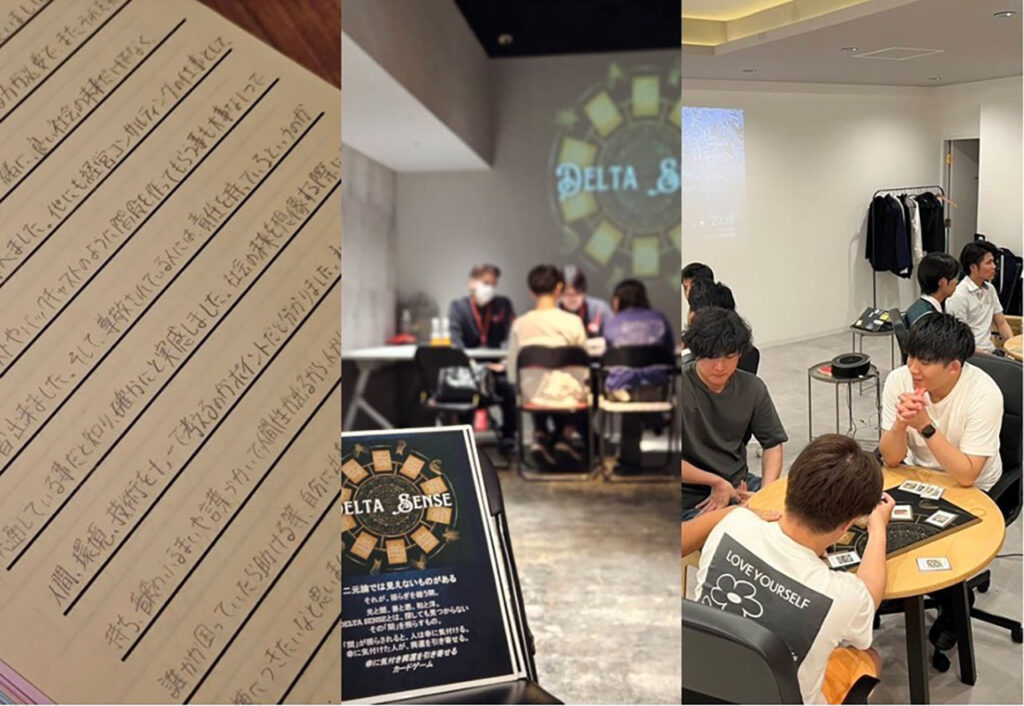A space design inspired by prayers: A wooden card game that fosters dialogue opens up a new way of wood education
Updated by Kazuhiro Aoki on October 08, 2025, 9:35 AM JST
Kazuhiro AOKI
Representative Director, WSense Corporation / DELTA SENSE Production Committee
Representative Director, WSense Corporation / DELTA SENSE Production Committee Born in Aizuwakamatsu City, Fukushima Prefecture. From a family background of flower arrangement, tea ceremony, and Noh theater, he has been exposed to Japanese culture from an early age. His interest in wood began when he witnessed a shrine carpenter "sharpening a plane" and became aware of the depth of the craft. Currently, based on the knowledge he gained as a Shinto priest, he is promoting initiatives that lead to the public interest. He is a member of the Tokyo Junior Chamber of Commerce, holds a graduate degree and an MBA (Master of Business Administration), and has been a Boy Scout and a soccer player since he was 4 years old.DELTA SENSE Official HP WSense Corporation
Why do human rhythms become stagnant while the forests mark a rhythm that never stagnates? We are now witnessing a completely new social issue: "species stagnation. We are therefore beginning an attempt to restore that rhythm through a card game. The "DELTA SENSE Cards," as the name suggests, focus on the triadic theory, and are a tool for "changing the way we see people and the world" by exploring the unseen in between through words, symbols, and sound waves. The most distinctive feature of the game is that it is the world's first wooden card game, which aims to foster new "bonds" between parents and children and their peers, and to bring out their own unadorned language, in contrast to conventional wood education, which focuses on building blocks and crafts. The aim of the game is to foster a new "bond" between parents and children, as well as between them and their peers. Designing an experience that will shape the future through wood-based education - that is the story of our development.
In the age of the attention economy that is spoken of these days, evaluation is easily inclined toward "how much of a response was received. The main focus has become only on obtaining information, and there are fewer opportunities to express one's true feelings in one's own unadorned words. And while the number of people sending out information has increased, the number of people listening has clearly decreased. While the expansion of diversity is precious, the hurdle to befriending strangers has risen, and the common language and shared morals that are the foundation of social capital have been shaken. That is why we decided that we need a way to touch each other's hearts first.

At first, we made prototypes of cards using paper. However, we began to focus on wood even though we had to disregard the cost because we realized that nature was "already" a part of our cultural background as Japanese speakers. For example, in Japan, we call God "Hashira," and trees are at the center of prayer, labor, and daily life: sacred trees, shrines, and Shinto shrine forests. In other words, for the Japanese, nature is a medium of empathy that requires no explanation, a "signal" to initiate dialogue even with strangers.
It began with the sound of a prayer. The congratulatory speech is a gesture that brings down something that has not yet been seen between something else and something else. We wanted to transplant this gesture into contemporary dialogue.

The style of the cards is designed to be interpreted in as many ways as there are viewers. It is not judgmental, not too guiding, but allows for a wide range of imagination. For example, concepts such as "boundaries," "margins," and "signs" free human beings from the dualism of good and evil, and evoke a sense of finding a third way.
What's hard is easy. What is easy is deeper." This concept is only possible when the design starts with a "tuning of the place" like a prayer. The concept of "What is difficult is easy, what is easy is deeper" is only possible with a design that starts with "tuning the place" like a celebratory prayer - this exquisite standard became the core of the card.
Mokuiku" is an activity to touch trees, to know trees, and to develop a sense of living with trees. We wanted to add the experience of "coloring the world we see" to the experience. The smell and feel of wood can calm our attention and soften our thoughts. When words and symbols that "capture the space in between" are layered on top of these, the dialogue will somehow turn from a "search for the right answer" to a "search for possibilities. In other words, only through Mokuiku can the concept of "coloring the world through the relationship between humans and nature" be nurtured. I believe that this experience will awaken a spirituality that Japanese people have almost forgotten.
Nevertheless, we made numerous mistakes in material selection, in warping and fragrance due to species, thickness, and color correction for printing. Wood is a difficult material to work with. However, this very difficultness made the development process more "polite". When we are polite, our words become sincere. At that time, I realized that the more divided a society becomes, the more it needs a place to settle down.
It colors the space between parents and children, between acquaintances, and between you and yourself. With just a touch of wood and a slight change in the way we see the world, words regain their sincerity and bonds quietly grow thicker.
Efforts have already begun in three directions.
<Education
For the past three years, Adachi Ward, Tokyo, has been using the cards for work experience for junior high school students and for third graders and above at large cultural facilities. The cards are highly appreciated by students and teachers alike, as they provide an opportunity to connect the content taught at school with social events.
<Region
The Tokyo Tower has adopted the program as one of its attractions, offering visitors "the experience of creating improvised questions from combinations and looking at the world anew". The museum has a "Meister" on staff, and although the event is held on a limited basis, it receives high satisfaction/reviews when it is held.

<Company
We have received feedback from our clients that the cards are a means of embodying abilities that are difficult to quantify (communication skills, ability to think outside the box, ability to make proposals, and validity of motives) during recruitment interviews, internal training, and planning meetings. For example, the cards are highly valued by companies for their ability to elicit "true feelings" that are difficult to discern in the application motive or ES, as well as "ideas" that transcend the boundaries of industry.
To create with wood is also to confront the cycle. Now that the artificial forests created after World War II are entering the period of full-scale use, we are trying to implement the cycle of "cutting, using, and planting" in society. The Forestry Agency's "Wood Change" initiative to expand the use of wood in construction and products is the key to achieving this. Wood stores carbon for a long time, and increasing demand for domestic lumber will directly lead to the regeneration of mountains and local economies. We want to increase the use of wood in our daily lives and workplaces. The world's first wood card will be a means to increase the utilization of scrap wood and waste wood in the future. In other words, our goal is to create a blessing from the round.
For example, the Ise Jingu Shrine's "Shikinen Sengu" ceremony is held every 20 years to renew the shrine pavilions. DELTA SENSE also hopes to create a gain (+) from a minus (-) by continuously renewing the blank spaces between people and the world, one by one. We hope to create gain (+) from minus (-).
Parent-child dialogue increases by one round trip. A single word in an interview can generate a deep question. A card is a cue for strangers in the community to exchange words. We believe that the accumulation of such small contacts will eventually change the culture, the economy, and the forests. (Kazuhiro Aoki, President, WSense Corporation / DELTA SENSE Production Committee)